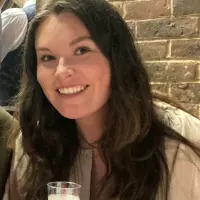Diagnosed in November 2020 Annabel and her mum Helen tell us about Annabel's gluten free...

Real Stories
Amy's Story
Amy was diagnosed with coeliac disease in 2014 after a stressful final year at university.
When did you get diagnosed with coeliac disease?
I got diagnosed in 2014 after a really stressful final year at university. I had suffered for a few years with the brain symptoms, and then I got what I thought was a stomach bug where I didn't leave the toilet for what seemed like weeks... When you have a stomach bug, you're often told to eat dry bread if you can stomach it, so that's what I was doing, not knowing I was making it worse! I had had other niggly symptoms like knee pain, rashes, numb hands, feet and skin crawling, but I wasn't in tune with myself enough to properly link it all together.
How did you feel about the diagnosis?
Absolute relief! It was by chance that a locum doctor tested me. I am still grateful for him to this day. Without him, I am not sure how long it would have been with the symptoms, probably a lot longer. I knew some people couldn't eat gluten, but I didn't know why or the extent of it, so it was a complete surprise too. I did also feel quite alone. When diagnosed after my appointment, the doctor printed me off a one-page info sheet and sent me on my way. It would've been good to learn more about the risks and deficiencies associated with the disease. I still don't know anyone personally who has coeliac disease, but I feel much less alone.
What was your relationship with food like before you were diagnosed with coeliac disease?
Before being diagnosed, I had a phase of being obsessed with 'clean' eating, which didn't involve bread or pasta etc. But I was still eating gluten in things like beer and sauces. So I was actually a great 'candidate' if there is such a thing, as I didn't have to cut a lot out at the start.
Have you ever felt like you have missed out because of coeliac disease?
Yes, in restaurants, I love eating out and have a select few places that are safe in Brighton to eat. In particular, when something is listed as GF but isn't safe for us coeliacs, it's so confusing still and frustrating. I feel the same about may contain warnings! There are loads of things that can be made equally delicious gluten-free, so I would love love love to see more restaurants turn completely GF. I also love travelling and now have to plan a lot more instead of being spontaneous when I go away and on the go. I find keeping GF snacks in my handbag eases the anxiety of being stuck without something to eat.
Did you notice a difference in mood and health after sticking to your gluten-free diet?
Yes, 100%. Before coeliac disease, I was put on anti-depressants because I was really low, struggling with confusion, anxiety, speech, lethargy and brain fog. After eating gluten-free for three or so months, I was able to come off the tablets as we had found the route cause! I also had terrible stomach pain and couldn't keep any food inside me, so it was such a relief not to feel that anymore and go back to 'normal'. I also had so much more energy. I suppose because I was able to absorb nutrients again.
What does eating "well" mean to you?
Eating a range of plant-based foods a week is a broad spectrum of the rainbow. Also, eating what you like, whether that is a brownie at the weekend or a burger with no restrictions aside from gluten! Eating mindfully and slowly and enjoying it!
What's your favourite Juvela product and what do you make with it?
My favourite product is the Part-Baked Rolls. They are delicious with some salted butter warm out of the oven! Simple!
What advice would you give to your younger self or to a newly diagnosed coeliac about what you now know about coeliac disease and gluten-free foods?
Empower yourself, do the research and take matters into your own hands. When it's the right time for you, join the wonderful gluten-free community and talk about it! Surround yourself with friends and family who do the research and learn, advocate for you and care about you. Never ever compromise. If you don't feel comfortable, don't eat it. It's not worth it!
And finally, what's your top tip for staying positive?
Coeliac disease is really hard at times. I don't think there is anything wrong with admitting that, I think that can be positive. But see your diagnosis as a route to health and happiness because it is. When you're ready, embrace it as it is a part of you and who you are.
Follow Amy on Instagram

